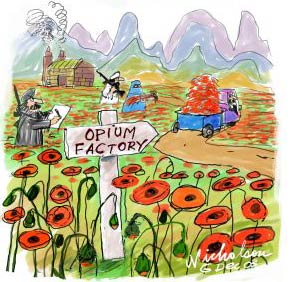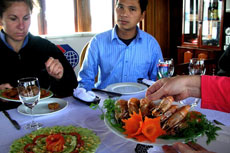Human Flower Project
Thursday, February 01, 2007
Afghan Poppies: Poison, Plow, or Look the Other Way
While national and international leaders haggle over how to handle the opium poppy, Afghanistan supplies 90% of the world’s heroin.

Cartoon: Pete Nicholson
2007 is shaping up as Afghanistan’s biggest year ever for opium poppies. The United Nations has reported that last year production rose almost 50%, and with ongoing confusion about how (or whether) to eradicate the fields, the 2007 crop should be even poppier.
An excellent story by Syed Saleem Shahzad for Asia Times reports 6200 tonnes of opium came out of Afghanistan last year, “to supply more than 90% of the world’s heroin.” Shahzad’s story describes how local officials, farmers, and a mafia-style network of distributors handle the flower drug. A British anti-narcotics officer in Afghanistan told Shahzad that any significant change would take three to five years to show results. “In Thailand,” he said, “it took 30 years to make counter-narcotics operations successful.”
Why? In part because opium production drives a third of the Afghan economy. Farmers say they can make 30 times more growing poppies than, say, wheat.
Also, authorities have very different ideas about how to reduce the poppy crop. The U.S. is pressing for a Colombia-style drenching with herbicides. But Afghan president Hamid Karzai has said he won’t allow spraying, because of its risks to human, animal and other plant life. Karzai advocates a low-tech eradication, with plows and trampling feet.
Now, we learn, Dutch troops stationed in Urguzan province have been told to ignore Karzai’s order. Dutch Development Cooperation Minister Agnes van Ardenne has said that destroying the poppy fields by whatever means would “endanger the reconstruction mission.”
Van Ardenne says that the NATO force was called to Afghanistan to stabilize the county. “That’s only possible if the population is working with us,” she said, “but the population won’t do that if people see that we, as it were, are playing along with the game of destroying the income stream, the only income stream of very many farmers.”
For now, it’s looking like a bumper crop. Afghan poppies are harvested in the spring.




